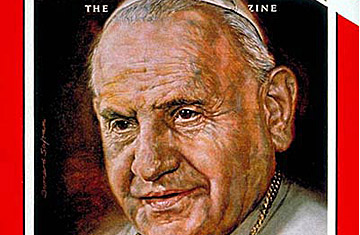
Pope John XXIII
(6 of 7)
Moreover, many scientists believe that scientific advances in years to come —the creation of real life in laboratories, the control of heredity—will challenge some basic Christian principles. If life is discovered on another planet, what relationship will it have with Christ? Harvard Astronomer Harlow Shapley believes that in the universe there are at least 100 million earthlike planets suitable for life. Christian the ologians—who hold that Christ came only to redeem man on earth—have already begun to grapple with this problem, but Philosopher Adler feels that they have not fully grasped its import. "What Christianity needs today," he says, "is a theology of outer space."
Accommodation? Christianity still has a lot of earthly problems to dispose of first, but it is at least finding new approaches to them. Though Christianity has suffered severe persecutions at Communist hands, many Christian theologians now feel that an accommodation with Communism is possible and desirable. Such an accommodation, in their view, would oppose atheistic materialism and Communism's blatant infringements upon human dignity, but would accept Communism's collectivism as not basically in conflict with Christian teaching. Says Princeton Theological Seminary Professor Hugh Kerr: "From a professional, theological view, this accommodation is possible."
Pope John, though he has roundly condemned "the mistakes, greed and violence" of the Soviet rulers, is known to feel that the 1962 brand of Communism is no worse than a lot of other problems the church has faced in the past. The Vatican's new attitude has already resulted in preliminary negotiations to open diplomatic relations with some Communist countries. In order to get Soviet permission for Russian Orthodox observers to attend the Vatican Council, the Secretariat for Promoting Christian Unity assured the Russian patriarchate that no anti-Communist statements would be made at the council.
Consecrated Materialism. To most Christian theologians, Communism is less of a threat than the philosophy of which it is the highest embodiment: materialism. "The aggressive virtues of ambition, success, prestige are getting ahead of the Christian virtues of the Beatitudes," says Samuel Miller, dean of Harvard's Divinity School. But materialism is at least as old as the Biblical dance around the golden calf, and more and more theologians believe that the way to combat it is to "consecrate" it.
Jesuit Theologian Avery Dulles says that "materialism could almost be reckoned as an asset. People, if they are more prosperous, have more openness, which is more favorable for the apostolate." Philosopher-Missionary Albert Schweitzer has long believed that materialism and spirituality are not mutually exclusive. "Behind materialism it is often possible to find great spiritual forces at work," he said some years ago. In U.S. aid to underdeveloped countries, the Peace Corps, huge U.S. charitable foundations and the free education of foreign students, theologians see the idealistic uses to
